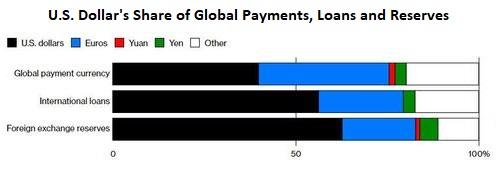If China wants superpower status, it will have to issue its currency in size and let the global FX market discover its price.
Quick history quiz: in all of recorded history, how many superpowers pegged their currency to the currency of a rival superpower? Put another way: how many superpowers have made their own currency dependent on another superpower's currency?
Only one: China. China pegs its currency, the yuan (RMB) to the U.S. dollar. It adjusts the peg a bit here and there, but the yuan's value is set by the Chinese state, not by the market of buyers and sellers.
(Yes, various nations have used gold coins minted by rival powers (Spanish pieces of eight were money everywhere, for example) but we're talking about fiat currencies, backed by nothing but supply and demand, not intrinsically valuable gold coins.)
Second question: is pegging your currency to a rival power's currency a sign of strength? The obvious answer is no. It's a sign of weakness. A real financial power issues its own currency and lets the global FX (foreign exchange) market discover the relative price/value of the currency. The financial power trusts the market to discover the value/price of its currency, and it responds by raising or lowering the yields on its government bonds and other pricing inputs.
If the issuing nation won't allow users and owners of its currency price discovery, few will want the currency because they can't trust the state's arbitrary, non-market price. This reality is reflected in the chart below of global currencies' relative share in global payments, loans and reserves. China's currency, the yuan (RMB) is basically signal noise: its global role in payments, loans and reserves is near-zero.
Why does China cling to state control of its currency's valuation? The obvious answer is that China's economy and global role are too fragile to absorb a major revaluation of its currency up or down: a major loss in purchasing power would raise the cost of energy and other imports, while a major strengthening of the yuan would crush the global competitiveness of China's goods and services. Related: Gold Mid-Tiers Rally On Fresh Earnings Reports
As for the idea that China will unpeg its currency when it backs it with gold, recall that "backed by gold" means "convertible to gold." If the yuan weakens and other nation-state owners of the currency decide gold is the safer bet, China will have to exchange yuan for gold if it wants to make good on its claim to be backing its currency with gold.
If the currency isn't convertible to gold, it isn't backed by gold at all; it's just another fiat currency backed by nothing.
If China wants superpower status, it will have to issue its currency in size and let the global FX market discover its price. Anything less leaves China dependent on the U.S. and its currency, the dollar.
If China is so powerful, why doesn't it let its currency float on the FX market like other trading nations? Until its currency floats freely like other currencies and the yuan's price is discovered by supply and demand, China's global role in currency payments, loans and reserves will remain near-zero. That is a weakness that appears to be insurmountable.

















